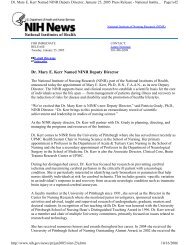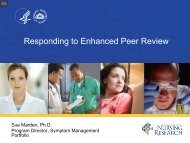Minutes - National Institute of Nursing Research - National Institutes ...
Minutes - National Institute of Nursing Research - National Institutes ...
Minutes - National Institute of Nursing Research - National Institutes ...
You also want an ePaper? Increase the reach of your titles
YUMPU automatically turns print PDFs into web optimized ePapers that Google loves.
VII.MECHANISMS OF STROKE-INDUCED IMMUNE SUPPRESSION ANDIMPLICATIONS FOR STROKE RECOVERY—Dr. Taura Barr, Assistant Pr<strong>of</strong>essor,West Virginia UniversityStroke is the third leading cause <strong>of</strong> death in the United States and a common secondary outcome<strong>of</strong> chronic cardiovascular disease. Poor recovery from stroke is <strong>of</strong>ten caused by infection,septicemia, or depression, and these outcomes are mediated by stroke-induced immunesuppression characterized by lymphocytopenia, inactivation <strong>of</strong> macrophages, increasedproduction <strong>of</strong> serum inflammatory signals, decreased T-cell proliferation, and atrophy <strong>of</strong> primaryand secondary lymphoid organs. Dr. Barr, an alumna <strong>of</strong> the Graduate Partnership Program(GPP), is further exploring post-stroke immune response and its implications for recovery.During her time as a student in the GPP, Dr. Barr identified a gene expression pr<strong>of</strong>ile specific tostroke and found that the majority <strong>of</strong> genes affected in this pr<strong>of</strong>ile were involved in innate oradaptive immune responses. Further work identified the Toll-like receptor (TLR) signalingpathway, which regulates pro- and anti-inflammatory signals as well as growth and neurotrophicfactors, as a primary pathway for response to stroke. Dr. Barr and her colleagues have identifiedenvironments and immune system factors that underlie differential responses to TLR signalingand can predict post-stroke outcomes, and they are exploring whether their findings can be usedto identify cardiovascular pr<strong>of</strong>iles that might predict post-stroke depression. She works withmany clinicians on her study protocols, with the ultimate goal <strong>of</strong> providing evidence to improveclinical care <strong>of</strong> stroke patients.19












